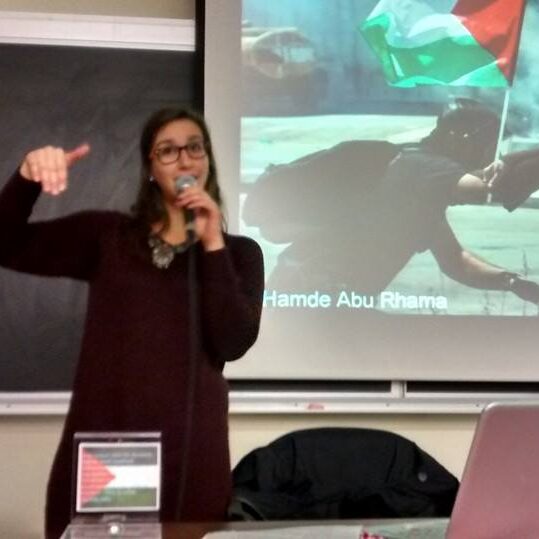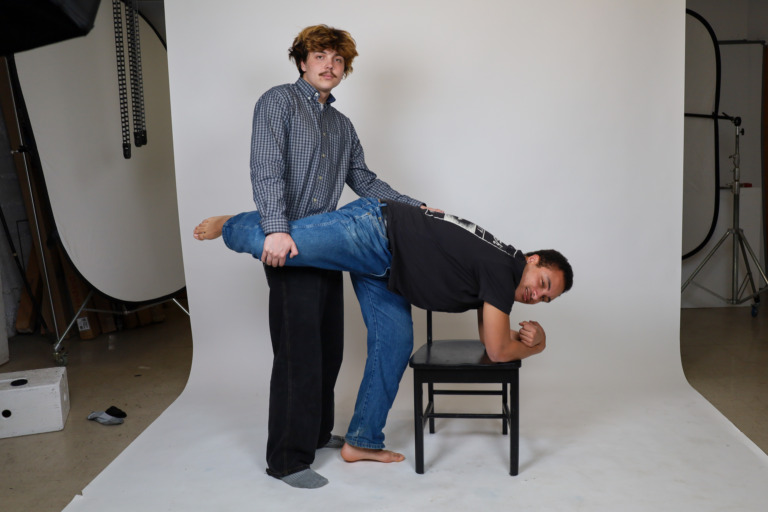
A view from the inside
Palestinian activist speaks about Israeli prisons
Mariam Barghouti is 21 years old. She studies English Literature and Philosophy, and is fluent in English and Arabic. While these traits might not sound different from many students in Halifax, that is where the similarities end.
Barghouti lives in the West Bank. She’s been arrested three times and beaten by prison guards. She’s also been published in the New York Times.
Speaking on Wednesday night in Halifax as part of a series of lectures for Israeli Apartheid Week, Barghouti described her personal experiences with Israeli prisons and the trying legal aspects of life as a Palestinian.
Students Against Israeli Apartheid (SAIA), a student society at Dalhousie University, organized their first annual Israeli Apartheid Week and flew Barghouti to Halifax for her talk.
Israeli Apartheid Week is an international event, but this is its first year being hosted in Halifax. SAIA’s schedule for the week ranges from Barghouti’s talk on the Israeli prison system to an evening focusing on Palestinian art, music and poetry.
While Barghouti’s talk was highly critical of the Israeli prison system and of the difficulties that Palestinians face because of Israeli courts and legislation, her primary focus was on her personal reflections.
Barghouti attended her first protest at age 17, at an event asking for unity within the Palestinian government.
“When you’re 17 you don’t understand the consequences, you just have this idealistic perspective that you want to make the world a better place and that you’re so strong and you’re invisible, and then slowly the consequences begin hitting you,” she said.
Last April, Barghouti was arrested at a protest and charged with stone throwing, which she says was a fabricated charge. Barghouti was detained for seven days and says she spent much of that time being shackled and verbally harassed.
Barghouti asked the audience at Dal’s Sir Charles Tupper building to close their eyes and imagine themselves in her shoes as she described the conditions in prison.
During Barghouti’s imprisonment, she composed a poem and memorized it, so that she would be able to write down the words upon her release.
“I like to think of myself as someone who knows how to utilize words. When I got out I read the poem and it was like me becoming a child again. I realized that that’s me regressing and that’s what the military system does: it takes inspired youth and drains them of any energy,” she said.
Barghouti’s talk was met with thunderous applause and numerous questions from the audience.
Dina Lobo, a member of SAIA, emphasized the importance of Barghouti coming to speak at Israeli Apartheid Week.
“We needed a Palestinian voice, especially since she’s young. We have a lot of experts speaking, we have a lot of professors speaking, but it’s really important for a Palestinian to speak about her personal experiences,” said Lobo.
Reaction from Jewish groups
While SAIA’s events have been met with great enthusiasm from many of their attendees, Jewish groups on campus have criticized SAIA for its choice of name.
Arielle Branitsky, director of Jewish Student Life at Hillel of Atlantic Canada, said “calling yourself against Israel apartheid is complicated for us, and it doesn’t say we want to have a peaceful conversation, it says we are against you and we want you to disappear.”
While the week’s events have been vocal in their condemnation of many Israeli actions, there has not been any conflict between SAIA and Dal’s Jewish community.
“There have been events that we’ve sponsored, where members of Israel on Campus attended. Sometimes we get members who provide their side of the story at our events. As far as I know there hasn’t been any confrontation, any negative interaction. Of course we stand on different sides of the spectrum but at the end of the day it’s opinions,” said SAIA member Yazan Khader.
Yasmine Mucher, a member of Israel on Campus, reinforces this opinion.
“They have every right to their programming and we have every right to do ours and I don’t feel we need to counter what we’re doing, we both just need to keep doing what we’re doing to support our causes,” said Mucher.
[Ed. note: In issue 147-20, the photo for this article was attributed to Eleanor Davidson. It was actually taken by Waleed Kadray. We apologize for any confusion.]






